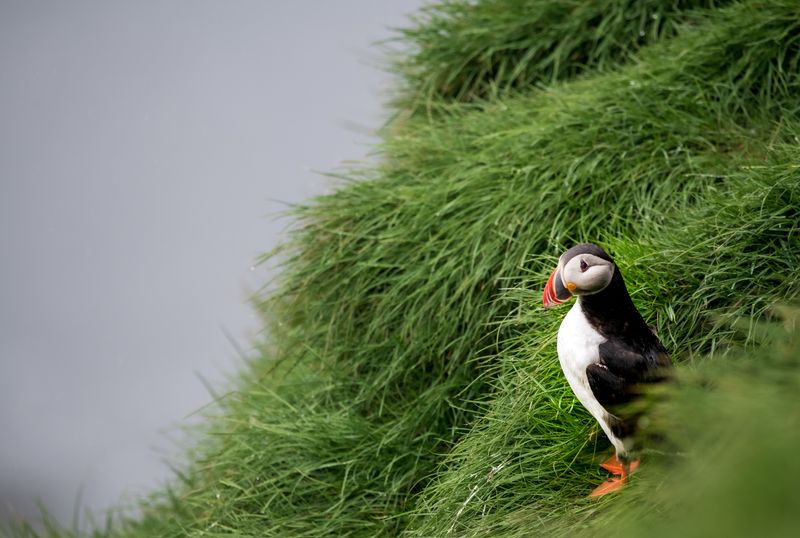Project Puffin: A 50-year Triumph that Brought Puffins Back to Maine
A Remarkable Conservation Journey
Project Puffin, a pioneering conservation initiative launched by Audubon’s Seabird Institute in 1973, celebrated its 50th anniversary this month. What began with a handful of puffin chicks translocated from Newfoundland to the low-lying Easter Egg Rock Island has now become a thriving and active puffin colony. The success of Project Puffin can be attributed to the groundbreaking ideas and efforts of Steve Kress, who conceived the project and dedicated his life to bringing puffins back to Maine.
Don Lyons, the current head of Audubon’s Seabird Institute, acknowledges the pivotal role of Steve Kress in the conservation of Atlantic Puffins. He states, “It’s very likely we would not have Atlantic Puffins if it were not for Steve Kress hatching this idea to bring puffins back.” Kress’s innovative techniques, such as translocation, the use of decoys, and the playing of recorded puffin calls, have not only strengthened the puffin colony on Easter Egg Rock Island but have also been adopted globally to aid the conservation of other seabird species.
Protecting and Studying Puffins on Easter Egg Rock Island
Easter Egg Rock Island, home to hundreds of puffins, terns, and gulls, is protected from human interference for three months of the year during nesting season. However, a team of four researchers lives and works on the island to care for the puffin population. They document the colony’s growth and health, starting from the youngest puffins. By banding the puffins and tracking their movements, researchers are able to gather valuable data on the puffins’ health, as well as the health of the ocean and the impacts of climate change in the Gulf of Maine.
Emma Lachance Linklater, one of the researchers on Easter Egg Rock Island, describes the experience of working with puffins as “magical.” The researchers diligently monitor the puffins, observing their fishing habits and analyzing the types of fish they bring to their nests. This information not only contributes to the understanding of puffin health but also provides insights into the overall health of the ocean ecosystem and the effects of climate change.
The Challenges Ahead
Despite the remarkable success of Project Puffin and the restoration of the puffin population in Maine, there are ongoing challenges that require active conservation efforts. Climate change and the warming waters of the Gulf of Maine pose significant threats to not only puffins but also other seabird species. Don Lyons emphasizes that the work of conservation cannot be abandoned and left to sustain itself. It requires continued participation and proactive efforts to preserve and protect the species in the Gulf of Maine.
The story of the puffins’ revival in Maine is not just a local success but a worldwide conservation triumph. The techniques pioneered through Project Puffin have been widely adopted, benefiting seabird colonies around the globe. Audubon estimates that Maine now has about 1,300 pairs of nesting puffins, a testament to the impact of long-term conservation efforts.
Editorial and Advice
The 50-year journey of Project Puffin serves as a powerful reminder of the importance of conservation and the potential for successful ecological restoration. It is a testament to the dedication and vision of individuals like Steve Kress, who recognized the value of preserving and protecting the natural world.
As we celebrate the achievements of Project Puffin, it is crucial to recognize that the work is not yet complete. The ongoing threats posed by climate change and human impacts require continued action and commitment to conservation. Individuals, organizations, and governments must prioritize the protection of wildlife and their habitats, implementing sustainable practices and policies that address the root causes of environmental degradation.
The success of Project Puffin provides hope and inspiration for similar conservation initiatives worldwide. It is a reminder that even in the face of monumental challenges, restoration and revival are possible. By learning from the strategies implemented in Project Puffin and supporting collaborative efforts on both local and global scales, we can contribute to the long-term conservation of endangered species and the preservation of our natural heritage.
In conclusion, Project Puffin’s 50-year triumph in bringing puffins back to Maine is a testament to the power of human intervention and conservation efforts. It serves as a beacon of hope for the future of endangered species and emphasizes the importance of proactive and sustained action to protect our fragile ecosystems. The success of Project Puffin should encourage us all to take responsibility for the well-being of our environment and the species that depend on it.

<< photo by Hari Nandakumar >>
The image is for illustrative purposes only and does not depict the actual situation.
You might want to read !
- Election Shocker Plunges Spain into Uncertainty: What’s Next for the Nation?
- Pikmin Bloom Expansion: New Missions and Celebrations Await in Pikmin 4
- On the Prowl: Police Launch Extensive Hunt for Lioness in Berlin
- Israeli Parliament Passes Controversial Judicial Overhaul Bill: A Blow to Democracy?
- Musk’s Twitter Logo Announcement Sparks Speculation and Controversy
- Scott Rolen and Fred McGriff Cement Their Place in Canada’s Baseball History
- Father recounts watching tiger shark attack daughter in Egypt




